Unit5 Do you want to watch a game show?Section A(1a-2d)课件(39张PPT)
文档属性
| 名称 | Unit5 Do you want to watch a game show?Section A(1a-2d)课件(39张PPT) | 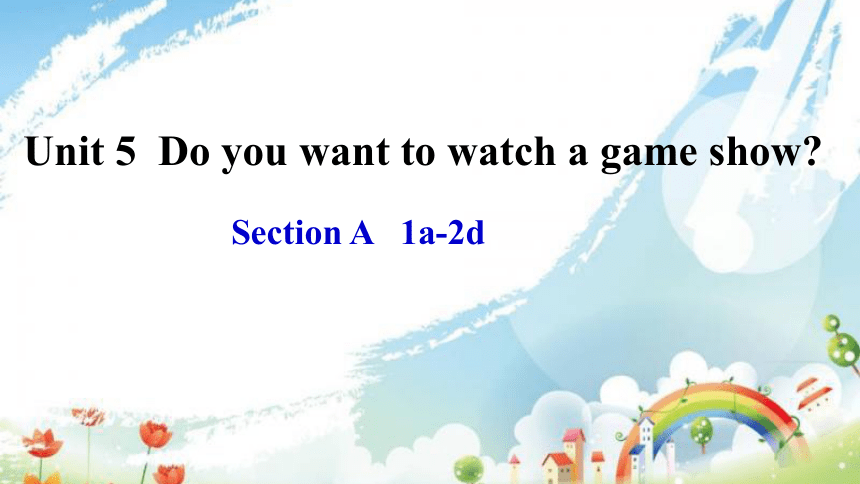 | |
| 格式 | zip | ||
| 文件大小 | 3.5MB | ||
| 资源类型 | 教案 | ||
| 版本资源 | 人教新目标(Go for it)版 | ||
| 科目 | 英语 | ||
| 更新时间 | 2018-11-05 18:48:57 | ||
图片预览


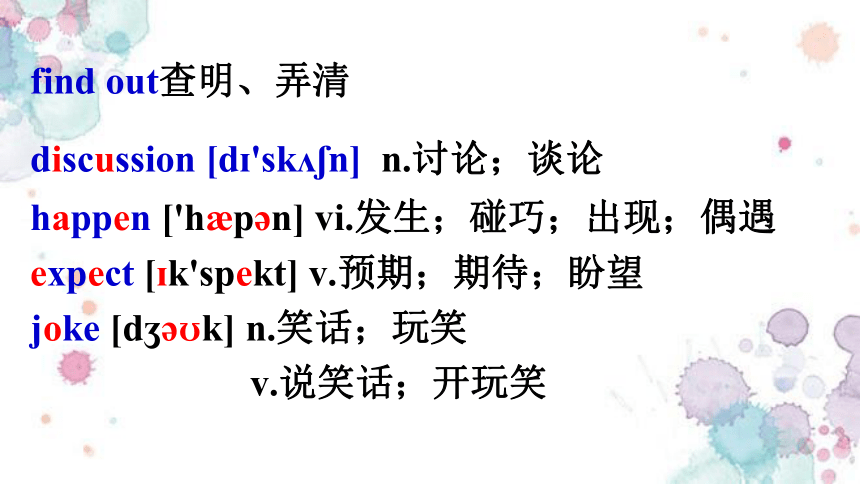
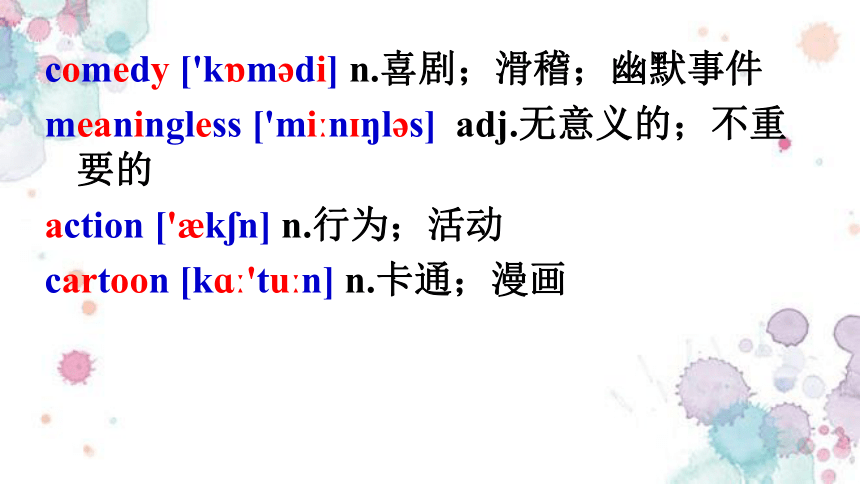
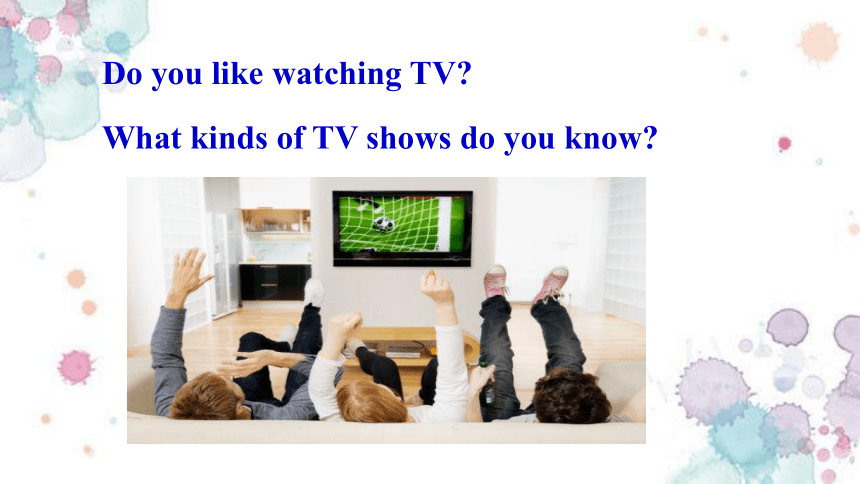




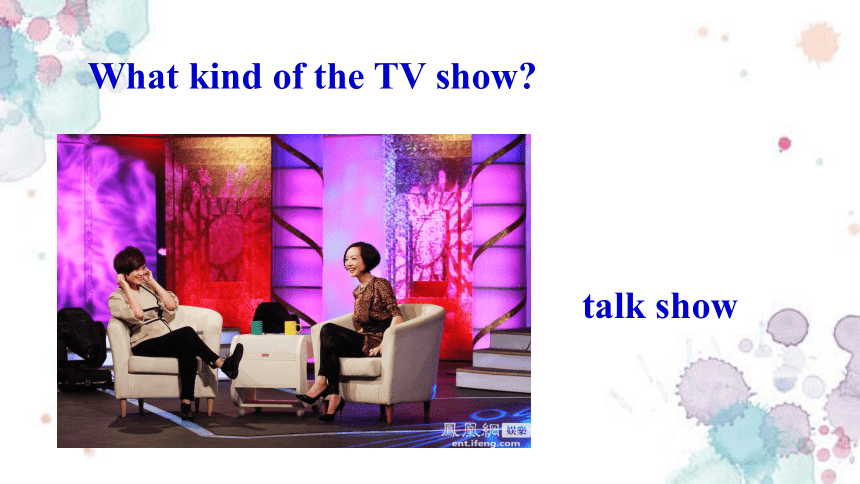


文档简介
Unit 5 Do you want to watch a game show?
Section A 1a-2d
sitcom ['s?tk?m] n.情景喜剧 (= situation comedy)
news [nju?z] n.新闻;消息
soap [s??p]opera['?pr?] n.肥皂;肥皂剧
mind?[ma?nd] v. 介意;对(某事)烦恼
stand [st?nd] v.站立;忍受
educational [?ed?u'ke???nl] adj.教育的;有教育意义的
plan [pl?n] n.计划;方法v.打算;计划
hope [h??p] v.希望;期望;盼望n.希望
find out查明、弄清
discussion [d?'sk??n] n.讨论;谈论
happen ['h?p?n] vi.发生;碰巧;出现;偶遇
expect [?k'spekt] v.预期;期待;盼望
joke [d???k] n.笑话;玩笑
v.说笑话;开玩笑
comedy ['k?m?di] n.喜剧;滑稽;幽默事件
meaningless ['mi?n??l?s] adj.无意义的;不重要的
action ['?k?n] n.行为;活动
cartoon [kɑ?'tu?n] n.卡通;漫画
Do you like watching TV?
What kinds of TV shows do you know?
What kind of the TV show?
News
What kind of the TV show?
Talent show
What kind of the TV show?
Soap opera
What kind of the TV show?
sitcom
What kind of the TV show?
talk show
What kind of the TV show?
game show
What kind of the TV show?
sports show
What kind of the TV show?
cartoon
1. talk show 5. game show
2. soap opera 6. talent show
3. sports show 7. news
4. sitcom
e
d
b
c
a
g
f
What do you think of talent shows?
I love them.
What do you think of soap operas?
I like them.
What do you think of game shows?
I don't mind them.
What do you think of sports shows?
I don't like them.
What do you think of talk shows?
I can't stand them.
Summary:
What do you think of … ? = How do you like…?
你认为/觉得……怎么样?
这两个句子常用来询问对方对某事或某人的看法和观点。
回答这类问句用:It’s great/ I don’t mind./I can’t stand.
eg.—What do you think of the action movie?
你认为那部动作片怎么样?
—I can’t stand.
我不能忍受
talent show talk show
soccer game news
1
2
3
4
A: What do you want to watch?
B: What do you think of talk shows?
A: They’re OK. I don’t mind them.
B: Then let’s watch a talk show.
love
like
don’t mind
don’t like
can’t stand
___ sitcoms ___ news
___ game shows ___ talk shows
___ soap operas
5
4
2
3
1
1. Sally likes to watch __________or________.
2. Lin Hui thinks she can learn some from sitcoms.
3. Sally thinks are more educational
than sitcoms.
4. Sally loves . She plans to watch Days of Our Past .
the news
great jokes
game shows
soap operas
tonight
talk shows
Language points
Lin Hui thinks she can learn great jokes from sitcoms.
林慧认为她能从情景喜剧中学到……
learn…from…“从……中学习……;从……获得……”。
该短语多用于两种情况:learn from sb./sth.或learn sth. from sb./sth.
e.g. What can you learn from the story?
从这个故事中你能学习到什么呢?
learn about
知道、了解
eg.We should learn more about Chinese history.
2.She plans to watch Days of Our Past tonight.
她打算今晚看《我们过去的日子》
plan v. 计划;打算
plan to do sth.计划做某事
eg. We plan to go shopping this Sunday.
plan n. 计划
make a plan 制定一个计划
eg. He made a plan for his vacation.
A: Do you plan to watch the news tonight?
B: Yes. I like watching the news. I watch it every night.
A: Why?
B: Because I hope to find out what’s going on around the world.
Language points
Because I hope to find out what’s going on around the
world.
因为我希望了解世界各地正在发生的事情。
hope v.意为“希望;期望”
常用结构:hope to do sth. 意为“希望做某事”
eg. I hope to be a winner.
区别hope与wish
hope 指可能实现的希望
hope to do sth. 希望做某事
eg. I hope to visit the Great Wall.
wish 指难以实现的愿望
wish to do sth.希望做某事
eg. I wish to go to shcool again.
wish sb to do sth. 希望某人做某事
eg.I wish you to come back next Monday.
动词词组,意为“查明;弄清”,强调经过调查、询问、打听、研究等一番努力或曲折之后才搞清楚、弄明白。
意为“找到;发现”,通常指找到或发现具体的东西,也可指偶然发现某物或某种情况,强调“寻找”的结果。
find out “查明;弄清”,强调经过一番过程,经了解和查询而搞清楚,弄明白某一情况。
e.g. Can you find out who broke the glass?
你能查明是谁打破了玻璃杯吗?
find out与find
find out:
find :
1.What did Sarah do in class today?
2.Does Grace like soap operas? Why?
3.What does Sarah think of soap operas?
4.Why does Sarah like news and talk shows best?
She had a discussion about TV shows.
Yes. She likes to follow the story and see what happens next.
She doesn’t mind soap operas.
Because she can expect to learn a lot from them. And she wants to be a TV reporter one day.
Language points
1. We had a discussion about TV shows.我们进行了一次关于电视节目的讨论。
have a discussion about “就……进行讨论”
eg. We had a discussion about buying a house.
have a discussion with sb “和某人讨论”
eg.Could I have a discussion with my friend first?
2.I like to follow the story and see what happens next. 我喜欢跟随故事情节了解接下来要发生的事情。
happen v. “发生;出现”。
happen的用法主要有以下三种:
(1)sth. +happen+地点/时间 某地/某时发生了某事
e.g. An accident happened in that street.
那条街上发生了一起事故。
What’s happening outside?
外面发生什么事了?
(2)sth.+ happen to +sb.
某人出了某事(常指不好的事发生在某人身上)
e.g. A car accident happened to him yesterday.
昨天他发生了交通事故。
What happened to you? 你怎么啦?
=What was wrong / the matter with you?
(3)sb.+ happen+ to do sth. 某人碰巧做某事
e.g. I happened to meet her in the street.
我碰巧在街上遇见她。
2.Well, they may not be very exciting, but you can expect to learn a lot from them. 哦,它们可能不是很精彩,但是你可以期望从中学到很多(知识)。
may是情态动词,意为“可能;也许;大概”。表示推测,一般用于肯定句中。
e.g.They may go to the beach next week.
他们可能下周去海滩。
may “许可、准许”用于疑问句
e.g. May I open the window?
expect v.意为“期待;预料”,一般有以下用法:
(1)expect to do sth. “预计做某事”。
e.g. I expect to see you again.
(2)expect sb to do sth. “期望某人做某事”
e.g. My mother expects me to be a teacher.
( )1. _____ to him yesterday?
A. What did happen B. What did he happen
C. What happened
( )2. The girl is not at school now. She ____ at home.
A. maybe B. mag is C. may be
( )3. My sister is not good at English, I hope ____.
A. you to help her B. you help she C. to help her
C
C
C
单项选择。
Exercise
( )4. Can you learn ____ from the man?
A. a lot B. lots of C. a lot of
( )5. What ____ he ____ of sports shows?
A. do, think B. do, thinks
C. does, think D. does, thinks
( )6. Her brother says he can't ____ the wallet.
A. think B. like C. stand D. stands
A
C
C
用所给词的适当形式填空
1. Peter wants (learn) English well.
2. I think soap operas are boring. Let’s (watch)a sports show.
3. —What do you plan (do)this evening?
—To surf the Internet.
4. We are having a (discuss)about hobbies in class.
5. Mr. White expects (have)a good job.
to learn
watch
to do
discussion
to have
Section A 1a-2d
sitcom ['s?tk?m] n.情景喜剧 (= situation comedy)
news [nju?z] n.新闻;消息
soap [s??p]opera['?pr?] n.肥皂;肥皂剧
mind?[ma?nd] v. 介意;对(某事)烦恼
stand [st?nd] v.站立;忍受
educational [?ed?u'ke???nl] adj.教育的;有教育意义的
plan [pl?n] n.计划;方法v.打算;计划
hope [h??p] v.希望;期望;盼望n.希望
find out查明、弄清
discussion [d?'sk??n] n.讨论;谈论
happen ['h?p?n] vi.发生;碰巧;出现;偶遇
expect [?k'spekt] v.预期;期待;盼望
joke [d???k] n.笑话;玩笑
v.说笑话;开玩笑
comedy ['k?m?di] n.喜剧;滑稽;幽默事件
meaningless ['mi?n??l?s] adj.无意义的;不重要的
action ['?k?n] n.行为;活动
cartoon [kɑ?'tu?n] n.卡通;漫画
Do you like watching TV?
What kinds of TV shows do you know?
What kind of the TV show?
News
What kind of the TV show?
Talent show
What kind of the TV show?
Soap opera
What kind of the TV show?
sitcom
What kind of the TV show?
talk show
What kind of the TV show?
game show
What kind of the TV show?
sports show
What kind of the TV show?
cartoon
1. talk show 5. game show
2. soap opera 6. talent show
3. sports show 7. news
4. sitcom
e
d
b
c
a
g
f
What do you think of talent shows?
I love them.
What do you think of soap operas?
I like them.
What do you think of game shows?
I don't mind them.
What do you think of sports shows?
I don't like them.
What do you think of talk shows?
I can't stand them.
Summary:
What do you think of … ? = How do you like…?
你认为/觉得……怎么样?
这两个句子常用来询问对方对某事或某人的看法和观点。
回答这类问句用:It’s great/ I don’t mind./I can’t stand.
eg.—What do you think of the action movie?
你认为那部动作片怎么样?
—I can’t stand.
我不能忍受
talent show talk show
soccer game news
1
2
3
4
A: What do you want to watch?
B: What do you think of talk shows?
A: They’re OK. I don’t mind them.
B: Then let’s watch a talk show.
love
like
don’t mind
don’t like
can’t stand
___ sitcoms ___ news
___ game shows ___ talk shows
___ soap operas
5
4
2
3
1
1. Sally likes to watch __________or________.
2. Lin Hui thinks she can learn some from sitcoms.
3. Sally thinks are more educational
than sitcoms.
4. Sally loves . She plans to watch Days of Our Past .
the news
great jokes
game shows
soap operas
tonight
talk shows
Language points
Lin Hui thinks she can learn great jokes from sitcoms.
林慧认为她能从情景喜剧中学到……
learn…from…“从……中学习……;从……获得……”。
该短语多用于两种情况:learn from sb./sth.或learn sth. from sb./sth.
e.g. What can you learn from the story?
从这个故事中你能学习到什么呢?
learn about
知道、了解
eg.We should learn more about Chinese history.
2.She plans to watch Days of Our Past tonight.
她打算今晚看《我们过去的日子》
plan v. 计划;打算
plan to do sth.计划做某事
eg. We plan to go shopping this Sunday.
plan n. 计划
make a plan 制定一个计划
eg. He made a plan for his vacation.
A: Do you plan to watch the news tonight?
B: Yes. I like watching the news. I watch it every night.
A: Why?
B: Because I hope to find out what’s going on around the world.
Language points
Because I hope to find out what’s going on around the
world.
因为我希望了解世界各地正在发生的事情。
hope v.意为“希望;期望”
常用结构:hope to do sth. 意为“希望做某事”
eg. I hope to be a winner.
区别hope与wish
hope 指可能实现的希望
hope to do sth. 希望做某事
eg. I hope to visit the Great Wall.
wish 指难以实现的愿望
wish to do sth.希望做某事
eg. I wish to go to shcool again.
wish sb to do sth. 希望某人做某事
eg.I wish you to come back next Monday.
动词词组,意为“查明;弄清”,强调经过调查、询问、打听、研究等一番努力或曲折之后才搞清楚、弄明白。
意为“找到;发现”,通常指找到或发现具体的东西,也可指偶然发现某物或某种情况,强调“寻找”的结果。
find out “查明;弄清”,强调经过一番过程,经了解和查询而搞清楚,弄明白某一情况。
e.g. Can you find out who broke the glass?
你能查明是谁打破了玻璃杯吗?
find out与find
find out:
find :
1.What did Sarah do in class today?
2.Does Grace like soap operas? Why?
3.What does Sarah think of soap operas?
4.Why does Sarah like news and talk shows best?
She had a discussion about TV shows.
Yes. She likes to follow the story and see what happens next.
She doesn’t mind soap operas.
Because she can expect to learn a lot from them. And she wants to be a TV reporter one day.
Language points
1. We had a discussion about TV shows.我们进行了一次关于电视节目的讨论。
have a discussion about “就……进行讨论”
eg. We had a discussion about buying a house.
have a discussion with sb “和某人讨论”
eg.Could I have a discussion with my friend first?
2.I like to follow the story and see what happens next. 我喜欢跟随故事情节了解接下来要发生的事情。
happen v. “发生;出现”。
happen的用法主要有以下三种:
(1)sth. +happen+地点/时间 某地/某时发生了某事
e.g. An accident happened in that street.
那条街上发生了一起事故。
What’s happening outside?
外面发生什么事了?
(2)sth.+ happen to +sb.
某人出了某事(常指不好的事发生在某人身上)
e.g. A car accident happened to him yesterday.
昨天他发生了交通事故。
What happened to you? 你怎么啦?
=What was wrong / the matter with you?
(3)sb.+ happen+ to do sth. 某人碰巧做某事
e.g. I happened to meet her in the street.
我碰巧在街上遇见她。
2.Well, they may not be very exciting, but you can expect to learn a lot from them. 哦,它们可能不是很精彩,但是你可以期望从中学到很多(知识)。
may是情态动词,意为“可能;也许;大概”。表示推测,一般用于肯定句中。
e.g.They may go to the beach next week.
他们可能下周去海滩。
may “许可、准许”用于疑问句
e.g. May I open the window?
expect v.意为“期待;预料”,一般有以下用法:
(1)expect to do sth. “预计做某事”。
e.g. I expect to see you again.
(2)expect sb to do sth. “期望某人做某事”
e.g. My mother expects me to be a teacher.
( )1. _____ to him yesterday?
A. What did happen B. What did he happen
C. What happened
( )2. The girl is not at school now. She ____ at home.
A. maybe B. mag is C. may be
( )3. My sister is not good at English, I hope ____.
A. you to help her B. you help she C. to help her
C
C
C
单项选择。
Exercise
( )4. Can you learn ____ from the man?
A. a lot B. lots of C. a lot of
( )5. What ____ he ____ of sports shows?
A. do, think B. do, thinks
C. does, think D. does, thinks
( )6. Her brother says he can't ____ the wallet.
A. think B. like C. stand D. stands
A
C
C
用所给词的适当形式填空
1. Peter wants (learn) English well.
2. I think soap operas are boring. Let’s (watch)a sports show.
3. —What do you plan (do)this evening?
—To surf the Internet.
4. We are having a (discuss)about hobbies in class.
5. Mr. White expects (have)a good job.
to learn
watch
to do
discussion
to have
同课章节目录
- Unit 1 Where did you go on vacation?
- Section A
- Section B
- Unit 2 How often do you exercise?
- Section A
- Section B
- Unit 3 I'm more outgoing than my sister.
- Section A
- Section B
- Unit 4 What's the best movie theater?
- Section A
- Section B
- Unit 5 Do you want to watch a game show?
- Section A
- Section B
- Unit 6 I'm going to study computer science.
- Section A
- Section B
- Unit 7 Will people have robots?
- Section A
- Section B
- Unit 8 How do you make a banana milk shake?
- Section A
- Section B
- Unit 9 Can you come to my party?
- Section A
- Section B
- Unit 10 If you go to the party, you'll have a grea
- Section A
- Section B
